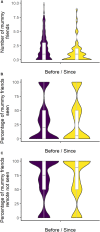Communication Across Maternal Social Networks During England's First National Lockdown and Its Association With Postnatal Depressive Symptoms
- PMID: 34045995
- PMCID: PMC8144711
- DOI: 10.3389/fpsyg.2021.648002
Communication Across Maternal Social Networks During England's First National Lockdown and Its Association With Postnatal Depressive Symptoms
Abstract
Postnatal/postpartum depression (PND/PPD) had a pre-COVID-19 estimated prevalence ranging up to 23% in Europe, 33% in Australia, and 64% in America, and is detrimental to both mothers and their infants. Low social support is a key risk factor for developing PND. From an evolutionary perspective this is perhaps unsurprising, as humans evolved as cooperative childrearers, inherently reliant on social support to raise children. The coronavirus pandemic has created a situation in which support from social networks beyond the nuclear family is likely to be even more important to new mothers, as it poses risks and stresses for mothers to contend with; whilst at the same time, social distancing measures designed to limit transmission create unprecedented alterations to their access to such support. Using data from 162 mothers living in London with infants aged ≤6 months, we explore how communication with members of a mother's social network related to her experience of postnatal depressive symptoms during the first "lockdown" in England. Levels of depressive symptoms, as assessed via the Edinburgh Postnatal Depression Scale, were high, with 47.5% of the participants meeting a ≥11 cut-off for PND. Quasi-Poisson regression modelling found that the number of network members seen in-person, and remote communication with a higher proportion of those not seen, was negatively associated with depressive symptoms; however, contact with a higher proportion of relatives was positively associated with symptoms, suggesting kin risked seeing mothers in need. Thematic qualitative analysis of open text responses found that mothers experienced a burden of constant mothering, inadequacy of virtual contact, and sadness and worries about lost social opportunities, while support from partners facilitated family bonding. While Western childrearing norms focus on intensive parenting, and fathers are key caregivers, our results highlight that it still "takes a village" to raise children in high-income populations and mothers are struggling in its absence.
Keywords: COVID-19; cooperative breeding; lockdown; maternal social networks; mothers; postnatal depression; social distancing.
Copyright © 2021 Myers and Emmott.
Conflict of interest statement
The authors declare that the research was conducted in the absence of any commercial or financial relationships that could be construed as a potential conflict of interest.
Figures


Similar articles
-
The impact of COVID-19 lockdown on postpartum mothers in London, England: An online focus group study.Z Gesundh Wiss. 2023 May 15:1-13. doi: 10.1007/s10389-023-01922-4. Online ahead of print. Z Gesundh Wiss. 2023. PMID: 37361305 Free PMC article.
-
Postpartum depression, social support and maternal self-efficacy between adolescent and adult mothers during the COVID-19 pandemic: A comparative cross-sectional study.J Adv Nurs. 2023 Jan;79(1):113-124. doi: 10.1111/jan.15445. Epub 2022 Sep 18. J Adv Nurs. 2023. PMID: 36117329
-
Postnatal depression and social supports in Vietnamese, Arabic and Anglo-Celtic mothers.Soc Psychiatry Psychiatr Epidemiol. 1998 Oct;33(10):483-90. doi: 10.1007/s001270050083. Soc Psychiatry Psychiatr Epidemiol. 1998. PMID: 9780811
-
New parents' experiences of postpartum depression: a systematic review of qualitative evidence.JBI Database System Rev Implement Rep. 2019 Sep;17(9):1731-1769. doi: 10.11124/JBISRIR-2017-003909. JBI Database System Rev Implement Rep. 2019. PMID: 31021977
-
Lonely, stressed-out moms: Does the postindustrial social experience put women at risk for perinatal mood disorders?Evol Med Public Health. 2024 Oct 4;12(1):204-213. doi: 10.1093/emph/eoae025. eCollection 2024. Evol Med Public Health. 2024. PMID: 39463797 Free PMC article. Review.
Cited by
-
The male breadwinner nuclear family is not the 'traditional' human family, and promotion of this myth may have adverse health consequences.Philos Trans R Soc Lond B Biol Sci. 2021 Jun 21;376(1827):20200020. doi: 10.1098/rstb.2020.0020. Epub 2021 May 3. Philos Trans R Soc Lond B Biol Sci. 2021. PMID: 33938277 Free PMC article.
-
Postnatal depression and anxiety during the COVID-19 pandemic: The needs and experiences of New Zealand mothers and health care providers.Midwifery. 2022 Dec;115:103491. doi: 10.1016/j.midw.2022.103491. Epub 2022 Sep 21. Midwifery. 2022. PMID: 36191380 Free PMC article.
-
Maternal and Neonatal Outcomes Associated with Mild COVID-19 Infection in an Obstetric Cohort in Brazil.Am J Trop Med Hyg. 2022 Oct 17;107(5):1060-1065. doi: 10.4269/ajtmh.22-0421. Print 2022 Nov 14. Am J Trop Med Hyg. 2022. PMID: 36252801 Free PMC article.
-
Social support during pregnancy and the risk of postpartum depression in Polish women: A prospective study.Sci Rep. 2024 Mar 22;14(1):6906. doi: 10.1038/s41598-024-57477-1. Sci Rep. 2024. PMID: 38519648 Free PMC article.
-
Understanding the impact of an AI-enabled conversational agent mobile app on users' mental health and wellbeing with a self-reported maternal event: a mixed method real-world data mHealth study.Front Glob Womens Health. 2023 Jun 2;4:1084302. doi: 10.3389/fgwh.2023.1084302. eCollection 2023. Front Glob Womens Health. 2023. PMID: 37332481 Free PMC article.
References
-
- APA (2013). DSM-5 Diagnostic and Statistical Manual of Mental Disorders, 5th Edn. Washington, DC: American Psychiatric Publishing.
-
- Archer C., Kao K. T. (2018). Mother, baby and Facebook makes three: does social media provide social support for new mothers? Media Int. Aust. 168 122–139. 10.1177/1329878x18783016 - DOI
LinkOut - more resources
Full Text Sources
Other Literature Sources

